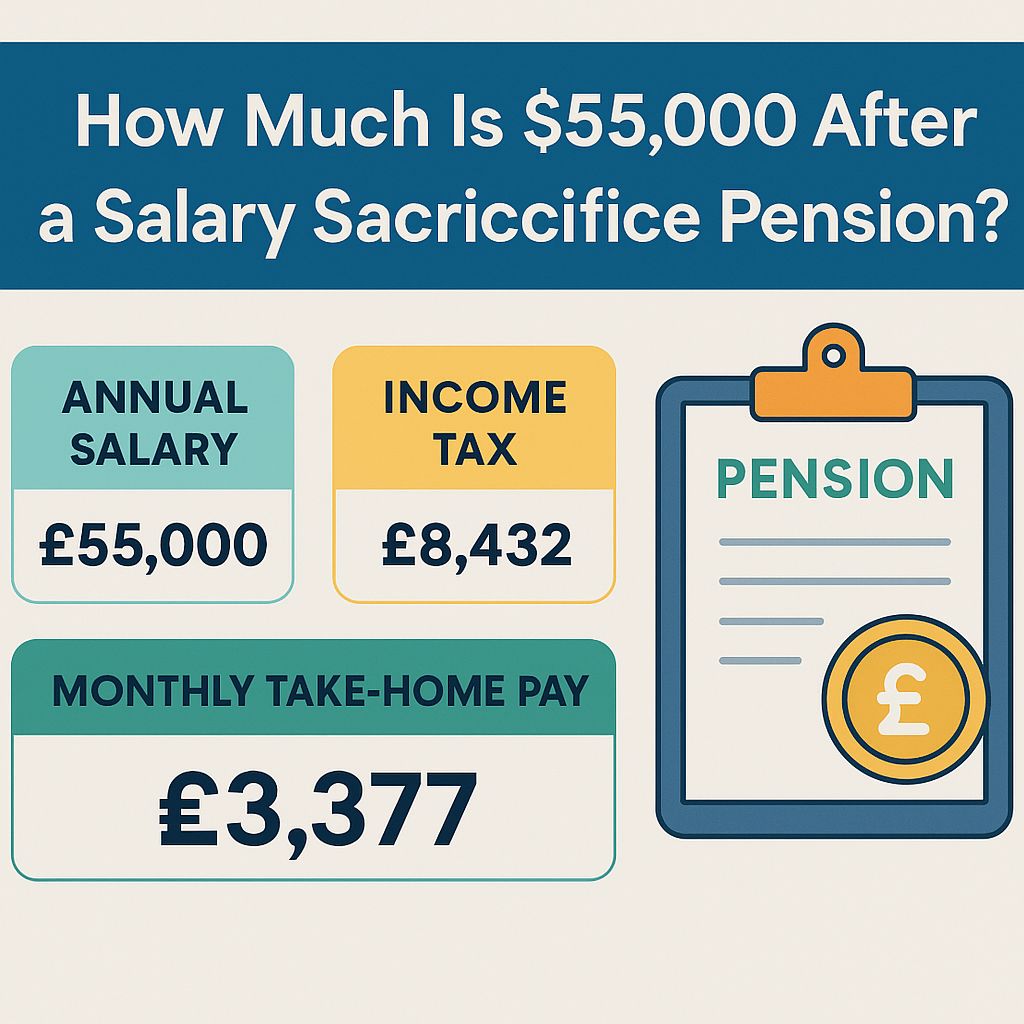
If you’re earning £55,000 a year, you’re in a solid financial position. But how you choose to contribute to your pension can make a significant difference to your take-home pay. One increasingly popular option is salary sacrifice, which allows you to lower your taxable income by redirecting part of your salary directly into your pension — before tax and National Insurance deductions. So, how much do you actually take home after tax if you opt for salary sacrifice on a £55,000 salary?
UK Salary & Tax Breakdown Calculator
If you live in Scotland, income tax is calculated differently.
Rates and thresholds set by Scottish Government.
A common tax code is “1257L” meaning £12,570 tax-free allowance. Check your payslip, P60, or HMRC letter for your correct code.
• Plan 1: Started before September 2012 in England/Wales
• Plan 2: Started after September 2012 in England/Wales
• Plan 4: Scottish students
• Postgraduate Loan: For master’s/PhD courses
Your payslip or SLC account will confirm your plan.
Summary: Take-Home Pay with and without Salary Sacrifice
| Scenario | Monthly Take-Home Pay |
|---|---|
| No pension contributions | ~£3,453 |
| 5% pension via regular method | ~£3,312 |
| 5% pension via salary sacrifice | ~£3,377 |
Figures based on 2025/26 tax year, tax code 1257L, and no student loan.
How Salary Sacrifice Works
Under a salary sacrifice arrangement, you agree to reduce your gross salary — in this case by 5% (£2,750) — and your employer contributes that amount directly to your pension. Because your official salary becomes £52,250, your Income Tax and National Insurance are calculated on that lower amount.
This results in:
- Less income tax paid
- Less NI paid (you save 8% on the sacrificed amount)
- More pension contributions without reducing your net pay as much as standard pension contributions would
Breakdown of a £55,000 Salary Without Pension
- Income tax: ~£8,432
- National Insurance: ~£3,115
- Monthly net: ~£3,453
This is your take-home pay with no pension contributions.
With 5% Pension via Standard Employee Contributions
- £2,750 contributed from post-tax salary
- Tax and NI remain based on the full £55,000
- Monthly net pay drops to ~£3,312
You contribute to your pension, but your tax and NI deductions stay the same.
With 5% Pension via Salary Sacrifice
- Your salary is reduced to £52,250
- Tax and NI are calculated on this reduced amount
- Income tax drops by around £550/year
- NI drops by ~£220/year
- Monthly net pay increases compared to standard method: ~£3,377
You save roughly £780/year in tax and NI — money that stays in your pocket while still contributing the same to your pension.
Should You Use Salary Sacrifice?
Pros:
- More efficient pension saving
- Higher take-home pay vs. normal pension contributions
- Can boost employer contributions in some cases
Cons:
- Lower official salary may impact mortgage affordability
- Affects some state benefits (e.g. maternity pay)
- You must opt in and get employer agreement
On a £55,000 salary, using salary sacrifice can boost your monthly income while still preparing for retirement. Instead of losing £140/month to a pension contribution the standard way, you could keep about £65 more per month in your pocket just by switching to salary sacrifice.
If you’re eligible, it’s one of the most tax-efficient ways to save for retirement — and it’s worth discussing with your employer or HR department.
Want to see your exact take-home pay with salary sacrifice and other deductions? Use our UK salary calculator to compare live figures based on your specific situation.
Check out:
- £70,000 Salary in the UK: What You Really Take Home in 2025
- 45,000 Salary in the UK
- What’s Your Daily Income from a £50,000 Salary in the UK?

